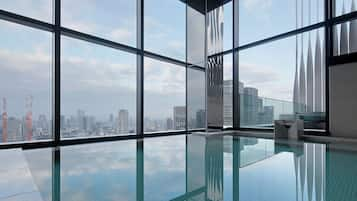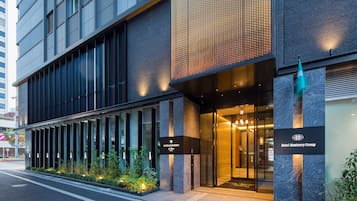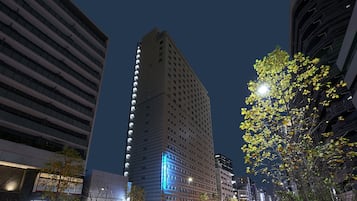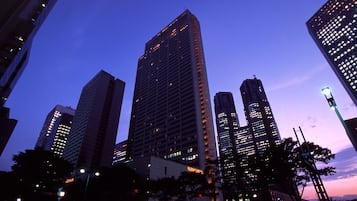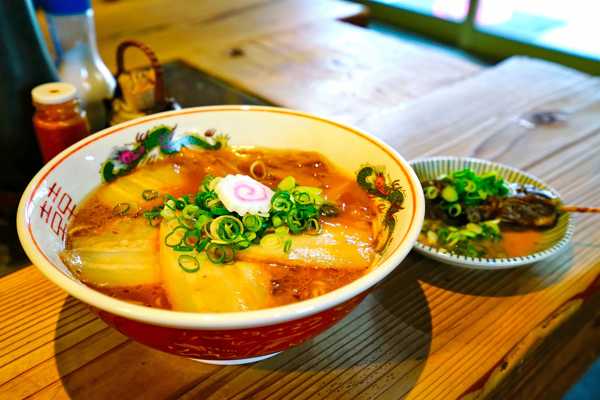Visiting Japan in autumn is a must-do, as the country's countless shrines and temples, as well as mountains and rivers are surrounded by red and golden foliage. Japan is beautiful year-round, but the best time for outdoor walks is between October and early December, when the country enjoys pleasantly cool days and low humidity. The brilliant changing colours of Japanese maples in autumn are hugely popular with local and tourists alike. Here are some of the best spots to see Japan's best autumn colours.
- 1
Eikando Zenrinji Temple
Kyoto

- Pör
- Hópa
- Myndatökur
Eikando Zenrinji Temple in Kyoto was founded in the early Heian period. With a history of more than 1,100 years, it’s come to be known as one of the oldest temples in Kyoto. The temple has been called the “Eikando of Autumn Leaves” since ancient times – it's one of the most famous sites to see autumn foliage in Japan.
There are about 3,000 maple trees, which look their best around mid-November. Many trees (mainly Japanese maples) surround the Japanese-style garden, which has a path around a central pond. Besides bringing spectacular colours to the Treasure Tower and Founder's Hall at daytime, the temple is illuminated at night during certain periods.
Staðsetning: 48 Eikandocho, Sakyo Ward, Kyoto 606-8445, Japan
Opnunartími: Daily from 9 am to 4 pm
Símanúmer: +81 (0)75-761-0007
Kortmynd frá Martin Falbisoner (CC BY-SA 4.0) breytt
- 2
Shogunzuka Seiryu-den
Kyoto

- Pör
- Hópa
- Myndatökur
Shogunzuka Seiryu-den is a very popular temple in Kyoto because its stage is larger than Kiyomizu Temple's famous platform. The temple is also famous for its beautiful autumn leaves. Its garden has winding paths with wonderful seasonal views, along with an observation deck overlooking Kyoto. There are about 220 trees dotting the space – when you look out over Kyoto from the hilltop observation deck, you get an awesome view of fiery red leaves.
Shogunzuka Seiryu-den is lit up at night at certain periods of the year. The illumination of autumn leaves in the dark is particularly beautiful. The leaves inevitably attract crowds to Shogunzuka Seiryuden Temple, but it's relatively serene for most of the year.
Staðsetning: 28 Zushiokukachocho, Yamashina Ward, Kyoto 607-8456, Japan
Símanúmer: +81 (0)75-771-0390
Kortmynd frá Tetsuhiro Terada (CC BY 2.0) breytt
- 3
Nagatoro Ravine
Saitama Prefecture

- Pör
- Hópa
- Myndatökur
Nagatoro Ravine is at the top of Arakawa River in Chichibu, Saitama. It's designated as a National Site of Scenic Beauty and a Natural Monument, attracting tourists from around the world. There are vivid autumn leaves on maple and oak trees along the Arakawa River, which flows through the ravine.
The reflection of red leaves on the water is very beautiful. It's a good idea to take a boat ride on the river to see the autumn leaves and layered rocks (which look like tatami mats). And don’t miss out on the illuminations at the Autumn Leaves Festival, which takes place in Nagatoro.
Staðsetning: Nagatoro, Chichibu District, Saitama, Japan
Kort - 4
Sounkyo Gorge and Daisetsuzan Volcanic Group
Hokkaido

- Pör
- Hópa
- Myndatökur
Sounkyo Gorge is located at the base of Mount Kurodake in Hokkaido’s Daisetsuzan Volcanic Group. This sightseeing spot has steep cliffs stretching for about 24 km across the Ishikari River. There are also waterfalls of all sizes across the area. It's said to be the earliest place to see autumn foliage in Japan – leaves near the summit start to change colour around late August every year.
A must-visit in Sounkyo Gorge, Ginsendai lets you see the surroundings and overlook mountains from a height of 1,500 metres. The scenery of coniferous and broad-leaved trees turning from green to yellow and red looks like a coloured woodblock print. Best of all, you can drive right up to the lookout point.
Staðsetning: Sounkyo Gorge, Kamikawa District, Hokkaido, Japan
Kortmynd frá Yasu (CC BY-SA 3.0) breytt
- 5
Hojuzan Risshaku Temple
Yamagata Prefecture

- Pör
- Hópa
- Myndatökur
Hojuzan Risshaku Temple is a famous place where Matsuo Basho composed his famous haiku, but that’s not the only reason to visit this temple. Overlooking the Momiji River Valley and Mount Omoshiro, it's also one of the best places to see autumn leaves in Yamagata. The Godaido Hall of Yamadera Risshakuji Temple is set against a background of autumn leaves on the mountain, together with rocky cliffs.
The best time to see autumn leaves is from late October to late November. Illuminations are put on at night during this season, but you can only enjoy it from the outside as the Hojuzan Risshaku Temple closes in the evening.
Staðsetning: 4456-1 Yamadera, Yamagata 999-3301, Japan
Opnunartími: Daily from 8 am to 5 pm
Símanúmer: +81 (0)23-695-2002
Kortmynd frá ぱちょぴ (CC BY-SA 3.0) breytt
- 6
Korankei Gorge
Aichi Prefecture

- Pör
- Hópa
- Myndatökur
Maple trees in Aichi's Korankei Gorge were planted by San-ei, the 11th head priest of Kojakuji Temple, every time he finished reading a volume of the Heart Sutra. There are about 4,000 maple trees, thanks to the voluntary activities of residents, which started from the end of the Taisho era until the start of the Showa period.
There are 11 kinds of Japanese maples spreading vivid yellows and reds along Tomoe River. The month-long Korankei Maple Festival takes place during the peak autumnal season. There are many viewing spots in Korankei Gorge, including Korankei Square, Kojakuji Temple, the area around Koran Bridge, and Taigetsukyo Bridge.
Staðsetning: Iimori Asukecho, Toyota, Aichi 444-2424, Japan
Kortmynd frá KAMUI (CC BY-SA 3.0) breytt
- 7
Kenrokuen Garden
Ichikawa Prefecture

- Pör
- Hópa
- Myndatökur
Kenrokuen Garden dates back to the Edo period, designated as one of Japan’s Special Places of Scenic Beauty and one of Japan’s 3 Great Gardens. The vast site covers about 110,000 square metres, with beautiful ponds, bridges and lanterns throughout. It’s worth visiting any time of the year, but the autumn leaves aren’t to be missed.
The garden has about 340 maple trees, producing an elegant and distinctly Japanese landscape. Understandably, Kenrokuen Garden is one of the most popular spots to see the changing leaves in Japan. The best time to be here is from mid-November to early December. It’ll be lit up on most nights in November, too.
Staðsetning: 1 Kenrokumachi, Kanazawa, Ishikawa 920-0936, Japan
Símanúmer: +81 (0)76-234-3800
Kort - 8
Mount Takao
Tokyo

- Pör
- Hópa
- Myndatökur
Many tourists visit Mount Takao throughout the year since it’s only 1 hour by train from central Tokyo. The busiest season is from mid-November to early December, when autumn leaves are at their most vivid. Check out the scenery of Japanese maples while riding a cable car or chairlift halfway up the mountain.
After arriving on the mountainside, you can walk to a nearby observation deck called Kasumidai. Here, you can see hundreds of trees in green, yellow and red. When you reach the summit after a 40-minute walk from the mountainside, you’ll find a square and another observation deck, from which you can see autumn leaves everywhere. The annual Mount Takao Maple Festival is also well worth a visit.
Staðsetning: Takaomachi, Hachioji, Tokyo
Kortmynd frá Leng Cheng (CC BY 2.0) breytt
- 9
Itsukushima and Momijidani Park
Hiroshima Prefecture

- Pör
- Hópa
- Myndatökur
Momijidani Park is a beautiful place that stretches along Momijidani River at the foot of Mount Misen Primeval Forest. Just a 5-minute walk from Itsukushima Shrine, it’s famous for its outstanding natural beauty in all seasons, particularly autumn. Around 700 Japanese maple trees in the park turn red like blazing flames, producing gorgeous scenery.
The view around the red Momijibashi Bridge in the park is especially beautiful and makes an excellent photo spot. The best time to visit is from mid-November to late November. It’s more compact than other famous sites in Hiroshima, but the path is covered with autumn leaves like a red carpet after the leaves start falling, so it’s a lovely place to take a walk.
Staðsetning: Momijidani, Miyajimacho, Hatsukaichi, Hiroshima, Japan
Kort - 10
Nara Park
Nara Prefecture

- Pör
- Hópa
- Myndatökur
Nara Park is famous for its wild deer, which are designated as National Natural Monuments of Jpan. Opened in 1880, the 600-ha garden is dotted with shrines and temples, including Todaiji Temple, Kasuga Taisha Shrine and Shosoin Repository. This popular spot also has excellent views of Mount Wakakusa.
Nara Park has a vivid view of evergreen trees, yellow ginkgo, and red maples in autumn. Ukimido in the south of Nara Park is another highlight. The beautiful view of autumn leaves from the bridge over Sagi Pond is very popular, too. The best time to visit is from mid-November to early December, but the scenery of ginkgo leaves fallen on the ground remains even after the season has ended.
Staðsetning: 30 Noboriojicho, Nara 630-8213, Japan
Símanúmer: +81 (0)742-22-0375
Kort







